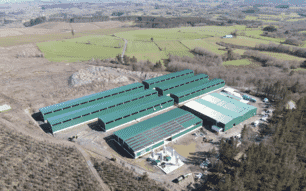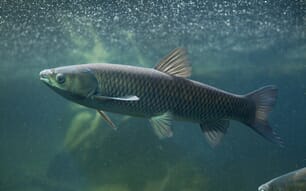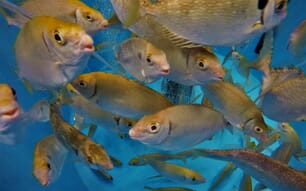The demand from the retail and foodservice sectors for products that can be seen to have been sustainably produced, farmed or caught under systems that are high in welfare and safety is placing more and more demands on the sectors.
These demands, ostensibly coming from the consumer, have led to an increasing number of accreditation bodies and programmes.
At the recent European Seafood Exposition in Brussels, the different accreditation bodies were out in force - each showing that there was a growing demand for their services.
The certification body GlobalG.A.P. demonstrated that it had quadrupled in size since 2010 and proudly announced that it now has more certified species of fish and shellfish than any other programme.
GlobalG.A.P. chairman Nigel Garbutt said: "We want to be mainstream. We have the largest on-farm certification for aquaculture and we feel this moves us forward to a more sustainable future."
Mark Nijhof said that GlobalG.A.P. takes a holistic approach to farm assurance.
He added that as aquaculture in many countries is conducted by small scale producers, the accreditation body has worked hard to provide guidelines for these small scale producers.
The organisation is also looking to the consumer and has recognised the need to provide information to the younger consumer by providing the certification information that is normally contained in a 13 digit figure on the pack label as an iPhone app.
The app links to the Myfish website providing all the relevant information to the consumer.
Mr Nijhof said that there was a clear chain of custody for the certification and through it GlobalG.A.P. had managed to remove bad practices in fish farming giving the consumer a responsibly produced product.
The GlobalG.A.P. standard also covers the production of feed for the farms ensuring worker safety, feed safety and responsible sourcing of raw materials.
Trygve Berg from GlobalG.A.P. said that the standard that had been adopted for certification had the potential to become an industrywide standard for aquaculture feed.
The Global Aquaculture Alliance with its Best Aquaculture Practices certification programme believes that certification and auditing of farms is improving practices, food safety and the environments.
Director of research Dr Michael Tlusty from the New England Aquarium said there is tangible evidence that the programme is making a difference.
He said the aim of the certification programme is to see improvements in the farms and not to allow them to become complacent because they have achieved the standard.
He said a recent survey of 265 shrimp farms that were being assess for certification saw 130 farms pass, 125 have some aspects of production not conforming with the certification needs and 10 failing completely.
Dr Tlusty said that most of those farms that were not fully complying with the needs of the programme went on to improve and receive certification.
He said that because farms have to be audited each year it meant that standards are maintained and improved. Those aquaculture farms that try a "quick fix" usually slide back and one of the most sensitive areas for non-compliance is over environmental issues.
The GAA Best Aquaculture Practices standard also covers the processing side of the chain as well as the hatcheries and the feed mills and the standards that are third party audited also conform to international norms.
Alongside the industry standards set by GlobalG.A.P. and the Global Aquaculture Alliance, there is the Aquaculture Stewardship Council.
The ASC has recently launched its accreditation for both tilapia and pangasius. Later this year the ASC will see its accreditation for bivalves - mussels, clams and scallops.
The accreditation is a consumer guarantee for responsibly farmed seafood and spells out the messaged to the consumer of the standards that have been achieved and the practices used to farm the food.
With these three certification bodies alone, however, there is concern that the different certification and auditing methods and the different practices that are monitored could breed confusion.
However, Mr Garbutt from GlobalG.A.P. said that his body works closely with the producers to ensure the standards are achievable.
"It offers the opportunity for producers to get on the first rung on the ladder for responsible aquaculture," he said.
Mr Garbutt added that the GlobalG.A.P. certification helps to achieve the ASC certification and he wants to see the two standards measured with one single audit.
He added that the two organisations work closely together to ensure the two programmes work together.
Peter Redmond from the GAA BAP certification body said that the one programme codifies best practices and this categorises the development of complementary and competing standards.
"The competition is important. In understand that it could be confusing, but it is important," he said.
He said that the standards promote best practices and help others share best practice and they also help to improve environmental issues surrounding aquaculture and improve sanitation in many countries.
The importance of certification programmes and recognition around the world is demonstrated by the work that the Chilean aquaculture company AquaChile is putting into receiving accreditation.
Having seen salmon production devastated by ISA in 2008/9, the company is aiming to reach a production of 22,000 tonnes this year and 55,000 tonnes in 2013. By 2016 the company wants to see that total doubled.
To achieve this and recognition in the world markets, the company hopes to achieve GlobalG.A.P. accreditation this year, ASC accreditation in 2013 and it is also looking to be certified for Best Aquaculture Practices and also by the British Retail Consortium.
The world's largest aquaculture company, Marine Harvest also stresses the importance of verified sustainability in production.
"People are looking for healthy food," said Siska Bourgeois from Marine Harvest.
"It is important we work sustainably. Biodiversity, welfare and impact on the environment - you have to manage it.
"Whether it is catch or farm, we make sure it is sustainable. However, the eco-label industry is very confusing for the consumer.
"The consumer sees it but does not know what is behind it. But they accept it."
Confusion Surrounds Assurance Schemes
ANALYSIS - The global aquaculture and sustainable fisheries industries are finding themselves under more and more scrutiny and increasing requirements to prove their worth and value, writes Editor in Chief, Chris Harris.
by Chris Haris




